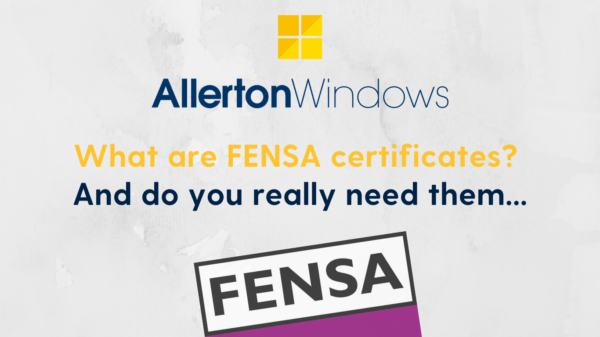What are FENSA certificates? (And do you really need them?)
When it comes to making home improvements, UK homeowners need to be aware of the importance of FENSA certificates. The Fenestration Self-Assessment Scheme plays a crucial role in ensuring that window and door installations meet building regulations and standards.
Working throughout the North West, including Liverpool and the Wirral, Allerton Windows specialise in more than just windows and doors. Our extensive services offer a wide variety of orangeries, conservatories and home extensions. With over 30 years of experience in the industry, we know FENSA like the back of our hands.
In this blog post, we’ll dive into the world of FENSA certificates, explaining what they are, why they matter, and how to obtain one. So if you’re ready for your next upgrade or renovation, you’re in the right place!

What is a FENSA certificate?
A FENSA certificate is a legal document that confirms that the installation of replacement windows and doors in a property complies with the current building regulations for England and Wales. It serves as proof that the installation has been carried out by a FENSA-registered company and that the products used meet the required standards for energy efficiency and safety.
Is Allerton Windows FENSA-registered?
Of course! As with every other building and regulation accreditation, Allerton Windows is always up to date on FENSA registration. Learn more about our company history today.
How to get a FENSA certificate?
To obtain a FENSA certificate, you must hire a FENSA-registered installer like ourselves. Registered installers have undergone assessment and training to ensure they meet the scheme’s high standards.
We’ll then carry out the window or door replacement, ensuring that it complies with building regulations and providing you with a contract and a guarantee for the work. We then notify FENSA of the installation who will then carry out inspections and assessments to verify that the work meets the required standards.
Once the work has been inspected and approved by FENSA, you will receive your FENSA certificate. This document should be kept in a safe place as it will be required if and when you decide to sell your property.
How long does it take to get a FENSA certificate?
If your door or window installer is registered with FENSA, they can self-certify their work upon completion of the job. This means FENSA will send out the certificates upon receipt of job completion. They typically take between 10 and 20 days to arrive in the post.
How to get a FENSA certificate retrospectively?
Obtaining a FENSA certificate retrospectively for window and door installations that were not originally certified can be a bit more complex, but it is possible. Here are the steps you can follow to get a FENSA certificate retrospectively:
- Start by finding a FENSA-registered installer who is willing to assess and certify the existing window or door installations. Explain your situation and request a survey to determine whether the installations meet the standards and building regulations.
- Your FENSA-registered installer will visit your property to assess the existing windows and doors. They’ll check whether the installations comply with the relevant building regulations, including safety, energy efficiency, and thermal performance.
- If the existing installations do not meet the required standards, you’ll likely need to make necessary upgrades or modifications to bring them into compliance. This might include replacing components or making structural adjustments.
- Once the upgrades are completed, the FENSA-registered installer will inspect the installations to ensure they now meet the necessary standards.
- The installer will then notify FENSA of the updated installations and request a retrospective certificate. They may conduct their own inspections to verify compliance with building regulations.
- If FENSA is satisfied with the upgrades and the installations now comply with the regulations, they will issue a retrospective certificate.
Always remember to keep all documentation related to the retrofitting and certification process in a safe place. This includes invoices, inspection reports, and the FENSA retrospective certificate itself.
It’s important to note that obtaining a retrospective FENSA certificate may involve additional costs for the assessments, upgrades, and inspections. The process can also be time-consuming, so it’s best to start as soon as possible if you require one for your property.
Do you need a FENSA certificate for doors?
Yes, FENSA applies to both windows and doors, including roof windows and lights. If you’re installing external doors, it’s still essential to comply with building regulations to ensure that the doors are safe, secure, and energy-efficient.

What does FENSA not cover?
FENSA doesn’t cover conservatories, porches, new builds, extensions, repairs (frame not included) or commercial properties. So if you’re looking to renovate, it is only the windows and doors you need to worry about.
Do I need a FENSA certificate for bifold doors?
Yes, since bi-folding doors are classed as doors, they come under FENSA regulations. This is only if they are replacement doors and doesn’t apply to new builds with bi-fold doors as standard.
Can you sell a house without a FENSA certificate?
A FENSA certificate is held against a house and not the property owner. Therefore any FENSA certificates must be handed to the new owner should the property be sold. In this sense, you cannot sell a house without the proper documentation.
The advantages of FENSA-approved windows and doors
We’ve been in the windows and door installation industry for over thirty years, we couldn’t even count the amount of surveys we’ve completed, it would take forever! With a FENSA certificate in hand, you can enjoy the benefits of a safer, more energy-efficient home and potentially increase your property’s value.
When it comes to home improvements, always trust a team with up-to-date registration in building regulations. And when it comes to selling your home, always make sure you’ve got your FENSA on hand!
Remember, regulations and requirements can change over time, so it’s essential to consult with local authorities or FENSA directly for the most up-to-date information on certification and compliance.
View this post on Instagram
